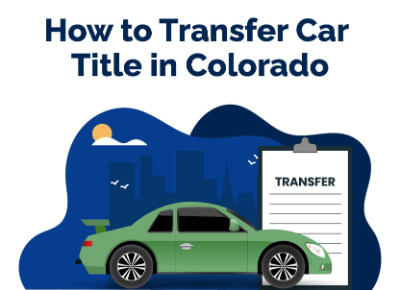How To Transfer a Car Title in Colorado
March 8, 2024


Chris is Head of Content for FindTheBestCarPrice and is based out of Philadelphia, PA. As a seasoned automotive industry analyst and car enthusiast, he ensures the highest level of quality across all our content and curates our picks for the best deals each month.
Chris studied information systems and marketing at Drexel University and writes about a wide range of topics ranging from car buying tips to troubleshooting common mechanical issues.
When he’s not thinking about cars, he likes to stay in with his dog and make an “attempt” to finish a crossword puzzle (he’s not quite at the Saturday/Sunday level…yet). As a former cheesemonger, Chris still has a “sharp” passion for all things cheese, and his fridge is always loaded with it!
Chris also has a passion for things that go fast, and drones are no exception. He spends some of his time writing for Dronesourced.
Since a car title is evidence of ownership, it must be transferred every time the car is sold, gifted, or inherited.
In Colorado, transferring a car title is relatively straightforward and involves only a few basic steps including:
- Seller and buyer sign the original title
- Complete the application
- Bring documents and ID to the DMV
- Pay the fees and wait for your new title in the mail
This article covers everything you need to know about how to transfer a car title in Colorado.
Key Takeaways
- You must transfer an out-of-state car title within 90 days of moving to Colorado.
- When buying a car, you must transfer the title within 36 hours.
- Transferring a car title in Colorado requires the signed title, bill of sale, emissions test, proof of insurance, and identification.
- The title transfer fee is $7.20.
Table of Contents
- Key Takeaways
- Documents You Need to Transfer a Car Title in Colorado
- How to Transfer a Vehicle Title in Colorado
- How To Transfer Car Title in Colorado If You're a New Resident With an Out-of-State Title
- How To Request a Replacement Title in Colorado
- How To Complete the Colorado Title Transfer Forms
- Lien Filing in Colorado
- Cost of Title Transfer in Colorado
- Common Title Transfer Mistakes
- Conclusion
- Best Car Deals by Category
- Frequently Asked Questions
Documents You Need to Transfer a Car Title in Colorado
To complete the car title transfer, you must present the following credentials to the county motor vehicle office:
- Proof of insurance (if registering the vehicle at the same time).
- Valid and verifiable identification.
- Current title or other proof of ownership endorsed by the previous owner.
- Completed odometer disclosure statement.
- Bill of sale for sales tax purposes.
- Mortgage document (security agreement) if there's a lien to be recorded.
How to Transfer a Vehicle Title in Colorado
Here's the process to follow to transfer the title:
- Complete the Application for Title and/or Registration form.
- Visit the Colorado DMV nearest you with the required documents.
- Pay the vehicle title fees, registration fees, and car sales tax if applicable.
- Receive the Colorado title via mail in 4-6 weeks.
How To Transfer Car Title in Colorado If You're a New Resident With an Out-of-State Title
Upon establishing residency in Colorado, you are granted a 90-day window to register your vehicle.
All states must adhere to Federal Law 28 CFR Part 25, National Motor Vehicle Title Information System (NMVTIS) as of January 1, 2010, to safeguard states, individuals, and businesses from motor vehicle title fraud.
Therefore, the State Title Section will process and mail the Colorado Certificate of Title.
Out-Of-State titles branded or stamped with "export only" or "junk" will not be titled in Colorado.
You must complete a Verification of VIN form (DR 2698) if the vehicle was registered in a different state. You must contact one of the following service providers directly to obtain this form:
- A Colorado law enforcement agency.
- A licensed Colorado motor vehicle dealer.
- A licensed Colorado emissions testing station.
- Manufacturer's Statement of Origin (if titled for the first time).
- Valid registration or title, along with a weight slip.
How To Request a Replacement Title in Colorado
One must appear at their local county office to obtain a replacement vehicle title in Colorado. To procure a replacement vehicle title, one must fulfill the following conditions:
- Valid identification if the vehicle was purchased on or after 7/1/2006.
- The title number and VIN of the vehicle in question
- Payment of the $8.20 fee for the duplicate title. Payment through the postal service must be tendered as a check and addressed to the "Colorado Department of Revenue" as the payee.
- A self-addressed stamped envelope must be included to receive the duplicate vehicle title by mail.
How To Complete the Colorado Title Transfer Forms
Complete the customary paperwork for automobile transactions, including the back and front parts of the vehicle title.
Subsequently, once the document is completed, provide it to the buyer. You are mandated to furnish the following particulars on the vehicle's title:
- Full names of the buyer and seller
- Signatures of the buyer and seller
- Notary's endorsement (if applicable)
- Date of the transaction
- Vehicle purchase price
- Vehicle Identification Number
- Mileage reading (a separate document may be necessary to provide this information)
Ensure all the details above are provided before going to your local DMV.
Lien Filing in Colorado
Lien placement on a vehicle is a procedure conducted at the county motor vehicle office in the jurisdiction where the vehicle is currently located. On the other hand, lien extensions are processed at the nearby county clerk's office.
Lien filing typically spans a decade, though this does not apply to various types of vehicles, such as multipurpose trailers, truck tractors, trailer coaches, manufactured homes, and motor homes assigned specific maturity dates by the lienholder.
Cost of Title Transfer in Colorado
In Colorado, there are specific fees imposed for vehicle titles. These fees are as follows:
- Title fee: The state charges a fee of $7.20 for obtaining a vehicle title.
- Vehicle type fee: Depending on the classification of the vehicle, there are additional fees:
-
- Passenger vehicles: A fee of $45 is applicable for passenger vehicles.
- Light truck vehicles: Light truck vehicles are subject to a fee of $90.
- Specialty fees: There is an extra charge of $50 for specialty fees in addition to the other fees.
- Sales tax: Colorado charges 2.9% sales tax on car purchases, and local counties may also charge sales tax. The average combined state and local sales tax rate is 6.319%.
Common Title Transfer Mistakes
Errors relating to vehicle titles include:
- Absent hand-written names, signatures, and job title of an agent signing on behalf of a company (unless a dealership or leasing company)
- Tampered odometer mileage or indicator
- Unmarked odometer indicator on the odometer statement
- Issues with Secure and Verifiable ID (SVID) on DR2842 include missing or incorrect ID information, lack of applicant or witness signature, or absence of the DR2421 Statement of One in the Same when the name doesn't match.
Conclusion
After moving to Colorado, you have 90 days to transfer your car title. When buying or selling a car, you must bring the documentation to the DMV within 36 hours. The process requires the signed title, bill of sale, proof of insurance, proof of emissions test, identification, and payment of fees and taxes.
Find out about the title transfer process for each state with our guides!
Best Car Deals by Category
Frequently Asked Questions
What is required to transfer a car title in Colorado?
To transfer a car title in Colorado, you must have a completed vehicle title, a bill of sale (if required), and a secure form of identification (like a driver's license).
Can I transfer a car title in Colorado without a bill of sale?
It depends. A bill of sale isn't required if you transfer ownership between family members. However, you'll need one to transfer a car title to a buyer.
How long does it take to transfer a car title in Colorado?
The duration of the transfer procedure varies. Generally, receiving the new title through mail takes around two weeks.
Can I transfer a car title online in Colorado?
You cannot transfer a car title online in Colorado. All transfers must be completed in person at a County Motor Vehicle Office.
What is the cost of transferring a car title to Colorado?
The cost to transfer a car title in Colorado is $7.20. Additional fees, such as sales tax, emissions testing, and registration fees, may apply.
Do I need to inspect my car before transferring the title to Colorado?
Generally, vehicles older than seven years do not require emissions testing. However, if you live in certain counties, emissions testing may be required regardless of the age of the vehicle.
Posted in Car Buying Tips |




